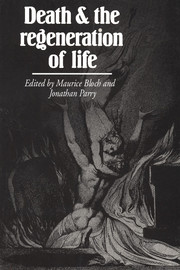Book contents
- Frontmatter
- Contents
- Preface
- Notes on contributors
- 1 Introduction: death and the regeneration of life
- 2 The dead and the devils among the Bolivian Laymi
- 3 Sacrificial death and the necrophagous ascetic
- 4 Witchcraft, greed, cannibalism and death: some related themes from the New Guinea Highlands
- 5 Lugbara death
- 6 Of flesh and bones: the management of death pollution in Cantonese society
- 7 Social dimensions of death in four African hunting and gathering societies
- 8 Death, women and power
- Index
6 - Of flesh and bones: the management of death pollution in Cantonese society
Published online by Cambridge University Press: 05 June 2012
- Frontmatter
- Contents
- Preface
- Notes on contributors
- 1 Introduction: death and the regeneration of life
- 2 The dead and the devils among the Bolivian Laymi
- 3 Sacrificial death and the necrophagous ascetic
- 4 Witchcraft, greed, cannibalism and death: some related themes from the New Guinea Highlands
- 5 Lugbara death
- 6 Of flesh and bones: the management of death pollution in Cantonese society
- 7 Social dimensions of death in four African hunting and gathering societies
- 8 Death, women and power
- Index
Summary
The ritual repertoire associated with death in Chinese society is so complex that it confounds those who would attempt to ‘make sense of it all’ as a uniform set of symbolic representations. This very challenge, no doubt, is precisely the reason why the subject has preoccupied three generations of sinological anthropologists. One of the most puzzling aspects of Chinese mortuary ritual is the extreme ambivalence shown toward the physical remains of the deceased. This seems to be particularly true for the rural Cantonese. Few who have witnessed a funeral among the Cantonese can fail to be impressed by the fear and apprehension that pervade the ritual. The general aversion to death, and anything associated with the corpse, is so overpowering that ordinary villagers hesitate to become involved, and yet the bones of the ancestors must be preserved at all costs as they are essential to the wellbeing of the descendants. The living gain some control over the natural environment by planting, as it were, the bones of their predecessors in auspicious locations. The bones then transmit the good geomantic influences of the cosmos to the living by means of a pig sacrifice ritual. These geomantic forces, known as ‘wind and water’ (feng shui in Chinese), can thus be harnessed for the benefit of descendants, provided the bones are located properly and preserved from decay.
For many centuries the Cantonese have followed a system of double burial whereby the corpse is first buried in a coffin and left for approximately seven years.
Information
- Type
- Chapter
- Information
- Death and the Regeneration of Life , pp. 155 - 186Publisher: Cambridge University PressPrint publication year: 1982
Accessibility standard: Unknown
- 57
- Cited by
